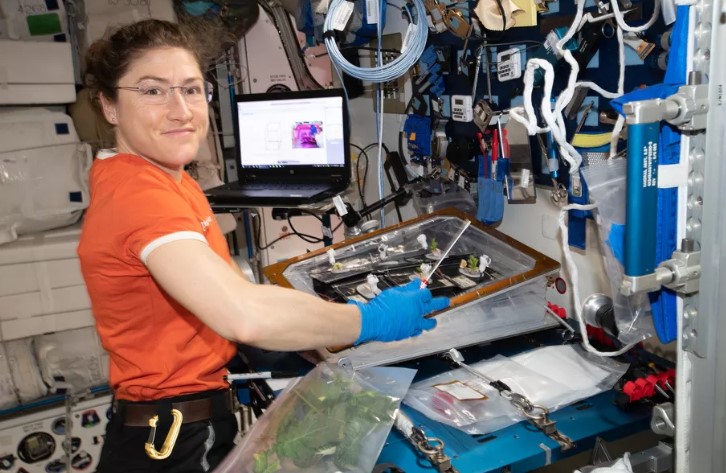
Today, NASA announced which astronauts will be traveling to and from the International Space Station through the end of the year, and the new schedule means one astronaut will now be breaking a big record while in orbit. Because of the new arrangement, NASA astronaut Christina Koch — who is already in space — will soon hold the title for longest single spaceflight by a woman, beating out the last titleholder, former NASA astronaut Peggy Whitson.
Koch launched to the ISS on March 14th, along with NASA astronaut Nick Hague and Russian cosmonaut Alexey Ovchinin. But rather than stay for six months, as most of NASA’s astronauts do, Koch is now slated to remain on the station through February 2020. That means she’ll spend 328 days, or nearly a full year, in orbit, which is one of the longest consecutive stays in space by any NASA astronaut. She’ll just miss beating Scott Kelly’s record of 340 straight days in orbit, the all-time record for a NASA astronaut. But she’ll beat Whitson’s time of 288 consecutive days in space.
The lengthy stay could be helpful for NASA to better understand how long-duration spaceflight affects the human body. While Kelly was in space for his year-long mission, he gave samples of his own blood and did other health analyses so that NASA could see how his body changed while in orbit. The space agency then compared Kelly’s health data to that of his twin brother, former NASA astronaut Mark Kelly, who remained on Earth throughout the full year. The experiment revealed a few surprising ways that space messes with the body, like damaging DNA and affecting cognition. NASA noted that Koch’s flight will also add to this growing area of research.
In addition to announcing Koch’s long trip, NASA also detailed when certain crew members will depart this summer as well as who will arrive later this year. After three crew members leave in June, a new set of three is slated to launch to the ISS in July, followed by another set of three in September. That means nine people will be on the station briefly before three people leave in early October. One crew member arriving in September is NASA astronaut and first-time flyer Jessica Meir who is also scheduled to stay for an extended mission, similar to that of Koch’s. She’ll be leaving in spring 2020.
The new crew schedules also mean that two women — Koch and Meir — will be on the station at the same time once again after current ISS crew member Anne McClain leaves in June. That opens up that possibility of a coveted all-female spacewalk actually happening in the year ahead. NASA had been planning to do the first all-female spacewalk in history last month with Koch and McClain, but McClain ultimately chose to swap out of the excursion due to issues with spacesuit sizing and logistics. More work still needs to be done on the outside of the station, so it’s possible that Koch and Meir may be assigned to do a spacewalk together. However, NASA did not make any indication that such a spacewalk would happen.
Today’s crew announcements also add some clarity to how the ISS will be staffed while NASA transitions to a new way of transporting astronauts to and from the station. Possibly before the end of the year, two of NASA’s commercial partners — SpaceX and Boeing — will begin flying crews to and from the International Space Station, as part of the agency’s Commercial Crew Program. SpaceX is slated to launch its first crew of two to the space station during a quick test flight in July, while Boeing is supposed to launch a crew of three sometime before the end of the year.
However, those flights are not at all guaranteed to occur as planned, as the Commercial Crew program has already experienced numerous delays and schedule changes. So while SpaceX and Boeing continue to prepare for those flights, NASA must continue to rely on Russia’s Soyuz spacecraft to transport its astronauts to space. All of the crews announced today will be flying on the Soyuz. So no matter what happens with the Commercial Crew flights, today’s announcements ensure that NASA will have at least a couple of astronauts on the ISS through the spring of next year.
If SpaceX and Boeing do fly people before the end of 2019, that means even more crews could be heading to the ISS this year, in addition to the ones announced today.
